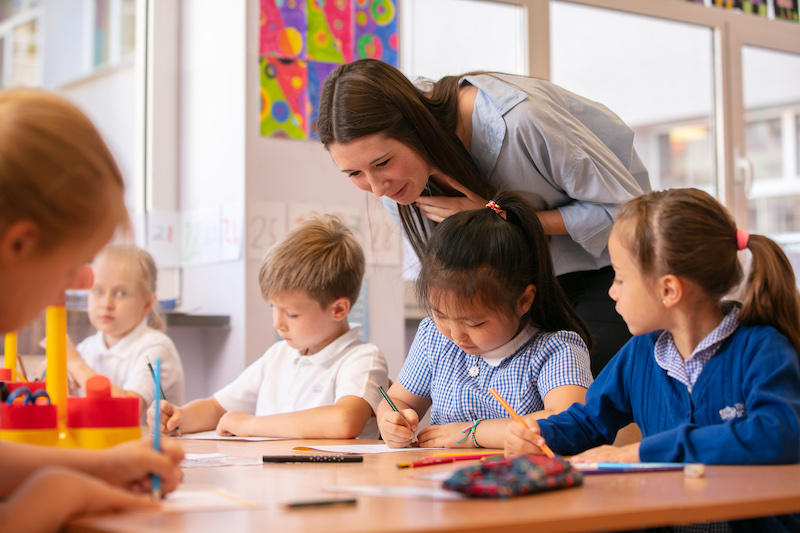Upholding the British standard in Poland
Posted on 11th Nov 2019 in School News, Poland
Q&A with Alun Yorath, Principal of The British School Warsaw.
For those unfamiliar with the school, how would you introduce The British School Warsaw to the outsider. What’s its back story, and what makes it special?
Our School Founder, Mrs. Iwona Thomas MBE, established The British School in 1992. Over 25 years we have grown from 38 students to 1200 students. We offer an international education with a British ethos catering to English speaking families who value the high academic standards and a truly international learning experience. We are non-selective, with over 70 nationalities most with English as a second language, yet we manage to achieve GCSE and IB results far above UK and international standards.
What is the British standard – what do you mean by this and how can you replicate it here in Warsaw? Define the underlying philosophy on which the British School operates.
British education overseas is a huge growth market with demand amongst expat and local communities. However, research has shown that the demand is not simply for a British curriculum or exam but for something less tangible. When parents are seeking a British Education they want a school which places value on the extra-curricular offer; where uniform, behaviour and timekeeping are pillars of a well-functioning community; and where high expectations are evident in all that the school does.
There is no shortage of international schools in Warsaw – in your view, what unique aspects elevate the British School Warsaw above others.
We are unique in Warsaw in that we are part of a family of 61 schools with Nord Anglia Education (NAE) which allows us to leverage international collaborations. Our students have the opportunity to travel to our expedition based snow-sports centre in Switzerland; renovate schools & build goat sheds in Tanzania; perform with over 500 talented musicians at the Juilliard School, New York; attend Space camp and STEAM festival at MIT University and take over UNICEF Headquarters in NY. Also recruiting outstanding internationally experienced teachers is at the heart of any successful international school, and our global presence allows us to attract the very best.
You have briefly mentioned your exam results and the quality of your teachers. Can you expand on these areas? Tell me more about your teachers, your results and just as importantly, tell me about your students?
Yes, our teachers are a diverse bunch! The vast majority are UK trained with many who have spent time overseas and we have Polish and other native language teachers. Our teachers are attracted by the professional opportunities afforded by being part of our very own Nord Anglia University.
Last summer our students excelled with 52% of all our GCSE exams were graded at A*-A, compared with an average of 20% in the UK. Our IB results scored an average of 35 points against a world average of 29.8. One of our students scored 45/45 which is truly remarkable with only 240 students worldwide scoring this mark. Additionally, almost 25% of our students achieved a score of 40+.
Our students make our school: They are diverse, internationally minded, hardworking, diligent, courageous, kind and a delight to teach.
What are the benefits of sending your child to the British School in Warsaw than, say, a British school in… Britain! Does being in Warsaw not hamper a student’s chance of entering a British university once they finish their studies there?
As an international school we can choose to select the very best components of any curriculum. In Primary school, we use the academic rigour and framework of the English National Curriculum as our foundation and extend this by International Primary Curriculum. For our older students we offer the International GCSEs programme which is benchmarked against UK and international students, so important for University applications but also in preparation for their ‘post-16’ studies. Our ‘Post-16’ curriculum is based on the world leading International Baccalaureate Diploma Programme and we have offered this for 15 years with huge success.
Most students in the UK will sit A Level examinations at ‘Post-16’. It is widely acknowledged that whilst A levels are the de-facto UK exam system; they significantly disadvantage applications even to UK Universities! Recent research by HESA, (Higher Education Statistics Agency) showed that 24% of A level students secured places at a top-20 UK university compared with 40% of IB students. Also an IB student is 20% more likely to secure a 1st class honours degree in the UK than an A level student.
Further HESA research shows a gap between IB and A-level students on their readiness to study at university. This study found that IB students were better prepared to study independently than A level students (94% compared with 49%) and their time and self-management skills were significantly more developed (91% compared with 47%). IB students are 25% more likely to achieve a Master’s or PhD degree than an A Level student due to their preparedness to succeed at University.
Your school has children aged 2½ to 18. What are the advantages of being able to cover the whole age range?
For children: Student role models, opportunities for student leadership and a sense of community. For Parents: Convenience, Security and a sense of community. For Teachers: Collaborations, Resources and a sense of community!
This article first appeared in the 2019/20 edition of John Catt's Guide to International Schools. You can read the digital version of the guidebook here: